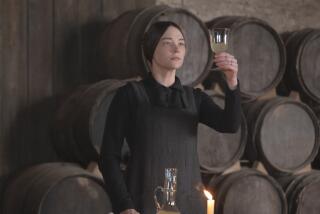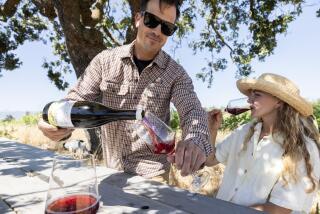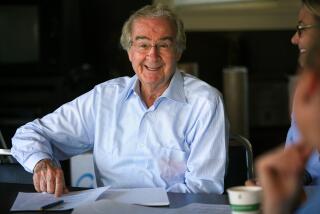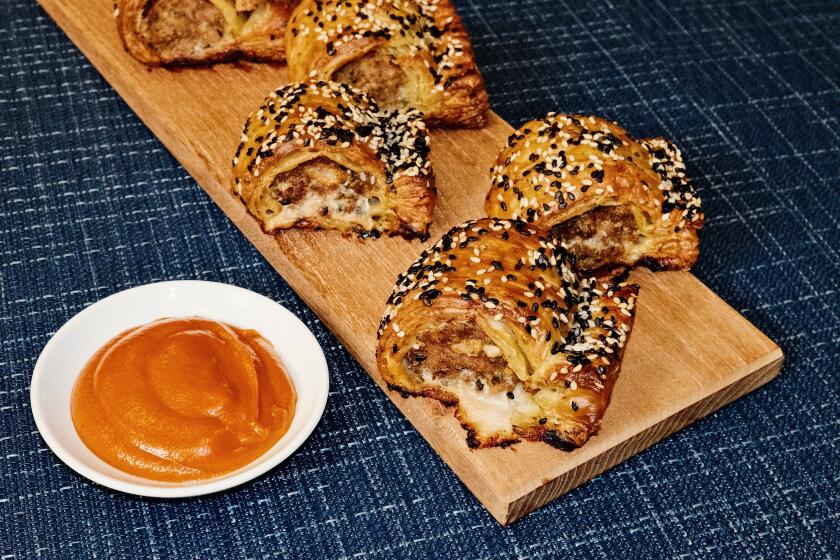The Best of ’92 : Winemaker of the Year
SANTA MARIA — The scientists at almost any major enology school would cringe if they saw how Jim Clendenen, winemaker and guiding spirit behind Au Bon Climat winery, handles wine.
The textbooks say winemakers should filter wines carefully during various stages of its production; they refer to “clean winemaking.” Clendenen rarely filters or fines. In fact he lets his wine sit on its sediment, the “lees” for many months. He leaves wine in the barrel a long time (one wine won’t be bottled until it’s been in oak four years). In sum, he runs risks few winemakers would hazard.
Neither is he bound by most other conventions of the wine business. Though his winery is so well known for its rich, Burgundian Pinot Noirs and Chardonnays that “ABC” has become as much a part of winespeak as “DRC,” he recently established another label called Il Podere Dell’Olivos, specializing in Italian varieties. And, with partner Bob Lindquist, he has established a line of Bordeaux-style wines called Vita Nova.
In short, Clendenen is the kind of winemaker who has given the entire Central Coast an identity as a region with the potential to make wines to equal the best in Europe. His enthusiasm and commitment to making “statement” wines are unmatched.
And that is why he is my 1992 Winemaker of the Year.
Clendenen’s image--long, stringy blond hair, earring, ultra-casual shirts and pants--could land him on one of Mr. Blackwell’s worst-dressed lists. Talking like a 33 1/3-rpm record being played at 78, he makes so many iconoclastic comments per minute he sounds ready for the fringe radio talk show circuit. But he’s just a wine fanatic. And that’s something the wine business needs more of.
When Clendenen isn’t flitting around the country chatting about his wines, he is likely to be in Europe. He’s in Germany right now, probably down in some musty cellar talking in tongues (titratable acidity, pH, malolactic fermentations, saignier . . .) to men twice his age (he’ll be 40 next month) about how to improve the breed.
Clendenen’s frequent partner, Bob Lindquist, is a quiet bearded man who is 13 days younger and works out of the same buildings here, producing wines under the Qupe label. Both make Chardonnay, but they part company with red wines. Clendenen makes Pinot Noirs that are startlingly complex and Burgundian. And he also makes a line of wines from Italian grapes that is beginning to gain recognition. Lindquist prefers Rhone varieties; his Marsanne and Syrah are in great demand.
Clendenen started as a “cellar rat” under Ken Brown at Zaca Mesa in 1978. Brown, who later founded his own Byron Winery not far away, was the first great Central Coast winemaker, turning out startlingly fine Pinot Noirs (and a lot of other great wine) a decade before anyone around here could even make them palatable.
Clendenen started Au Bon Climat in 1982 with partner Adam Tolmach, making the wines out of a run-down former dairy building, and he immediately began challenging old notions. Some of the ideas came from his visits to Europe; others were simply methods he felt would work. (Clendenen recently purchased Tolmach’s interest in ABC. Tolmach now makes wines under the Ojai label.)
I think the best wine Clendenen makes is the Pinot Noir from the Sanford and Benedict Vineyard ($30), which has real richness and depth. More tobacco-like is his stylish Pinot Noir from the Bien Nacido Vineyard ($20). Au Bon Climat’s regular line of Chardonnay and Pinot Noir ($15 each) are also in great demand, though the reserve bottlings, despite $25 price tags, are even more popular.
Clendenen’s Nebbiolo is also impressive; it’s the first American wine that begins to approach a true Italian Nebbiolo. The 1989 Il Podere Dell’Olivos Nebbiolo ($12) shows much more depth and concentration than most wines from that grape made in the United States.
Denser still is the 1988 Nebbiolo. It’s still in the barrel, following the example of the Piemontese, who age their best wines four years or more before bottling. The first vintage will be called Parabola and will cost about $18 a bottle. Sales will be limited to those few stores that supported Au Bon Climat in its early years.
There is also a 1992 Barbera, a small amount of which will be released next summer at a price well under $10 (according to plans). The remainder of the wine will be left in barrel, to be released when ready. Price: as yet undetermined.
Under the Podere label too is a 1991 white wine called Arioso ($12), a blend of Pinot Blanc, Sauvignon Blanc and Muscat that’s tasty and complex. The 1991 Bricco della Moana ($10), a Sauvignon Blanc blended with a bit of Chardonnay, is a good value. The wine is more like the latter grape than the former.
And the Vita Nova line he shares with Lindquist has come into its own. “We started it to make Cabernet,” says Clendenen, adding that many in the last decade have given up on Cabernet Sauvignon in Santa Barbara County because of cool weather and a history of erratic wines, “but we believed in it.”
Under the Vita Nova brand, the partners have a 1991 Sauvignon Blanc called Le Chien Mechant ($10); a 1990 Cabernet Franc ($12), and a 1991 Chardonnay ($16). There are also two wines (a red and a white) called Reservatum ($18 each). The white is a 1991 Semillon that, tasted out of the barrel, is a classic, resembling a great white Bordeaux. The red is Cabernet-based and requires time in the cellar to round out.
The partners also make a wine they call Thumbs Up, a dessert wine made from late-harvested Riesling that is barrel-fermented and made like a Sauternes.
There are few winemakers with more passion for what they do than Jim Clendenen. And it is this intensity that has rubbed off on many of his Central Coast brethren including Lindquist, Bryan Babcock at Babcock Vineyards, former partner Tolmach under the Ojai brand, Stephan Bedford at Rancho Sisquoc Winery, Lane Tanner at Lane Tanner Wines and Rick Longoria at Gainey Vineyard.
More to Read
Eat your way across L.A.
Get our weekly Tasting Notes newsletter for reviews, news and more.
You may occasionally receive promotional content from the Los Angeles Times.










